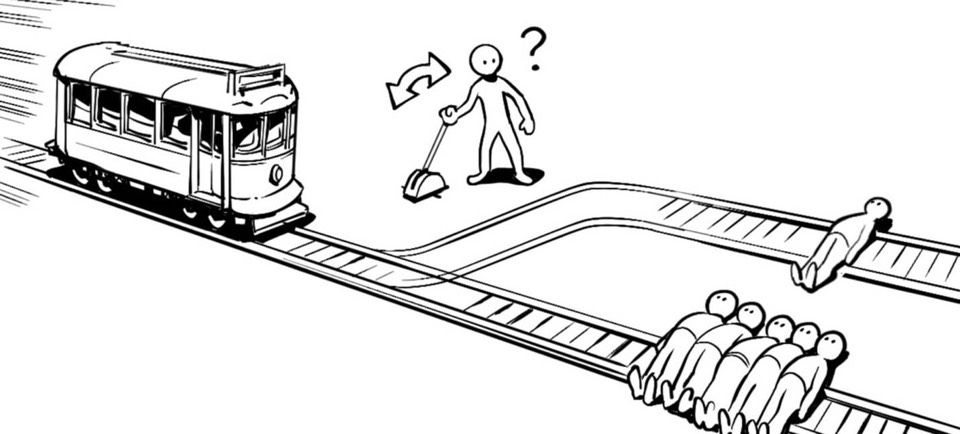Ethically Challenging Situations
Apr 06, 2019 • 241 views
Is it easy to find out which is the most moral decision in every ethically challenging situation? Let us see some popular examples in ethics which put us in critical ethical dilemmas. Imagine that you are walking beside rail or tram tracks. You saw a trolley (as shown in pic below) rushing towards 5 workers who could not hear the sound of trolley. Consider it would be too late for them to escape when they find the trolley very near to them. You also have a lever near you which you can pull to change the track of the trolley. There is a single worker who is also deaf on the other track. You have ONLY two options: Save 5 by killing one or save 1 by killing five.

Most of the people answer save 5 and kill 1 by changing the trolley’s track. We take this decision by focusing on the result or consequence of our act. That means we are following the theory of consequential morality or Utilitarianism proposed by Jeremy Bentham, an English Philosopher. The basic principle was that “results of one’s act are the ultimate basis to judge whether an act is right or wrong” or simply ‘greatest good for the greatest number’.
It may not be easy to apply this theory and make suitable decision in every situation. For instance, Imagine that you are a doctor. You have 5 patients in one ward who are in need of transplantation of 5 different organs like two lungs, two kidneys and a heart. You have another one patient in 2nd ward who had a leg injury. If you kill this one patient and take his lungs, kidneys and heart, you can save the 5 patients in the other ward by transplanting these organs to them. Will you kill that 1 patient?
Most probably, you can’t say yes. You are ready to kill 1 and save 5 in that trolley example but not in this doctor example. But in both examples, there are the same 5 precious human lives. There is greater good happening in this situation also.
So, there is an another school of thought exists in ethics regarding decision-making opposed to above Utilitarianism called theory of categorical imperative which is proposed by Immanuel Kant in 18th century. This theory is nothing but the crux of our own Bhagawadgita written 1000s of years ago that themoralityof an action should be based on whether that action itself is right or wrong under a series of rules and duties, rather than based on the consequences of the action. In Mahabharat, when Arjuna was in Ethical dilemma whether to kill his hundreds of relatives or to quit the war, Lord Krishna advises him to focus on the duty as a warrior or king not to think about the consequences.

Being good seems to be easy but it is difficult when we encounter challenging situations. In U.S vs Holmes Case, even courts were in a difficult situation whether to punish a ship captain or not, who threw 16 passengers into the sea to save sinking ship which contains other passengers. Even though his act saved greater no. of passengers, he was punished for killing 16 Passengers. So, Legally speaking, No one can have a right on other’s life irrespective of the situation unless the person is attacking you and you have to act in self-defence.
